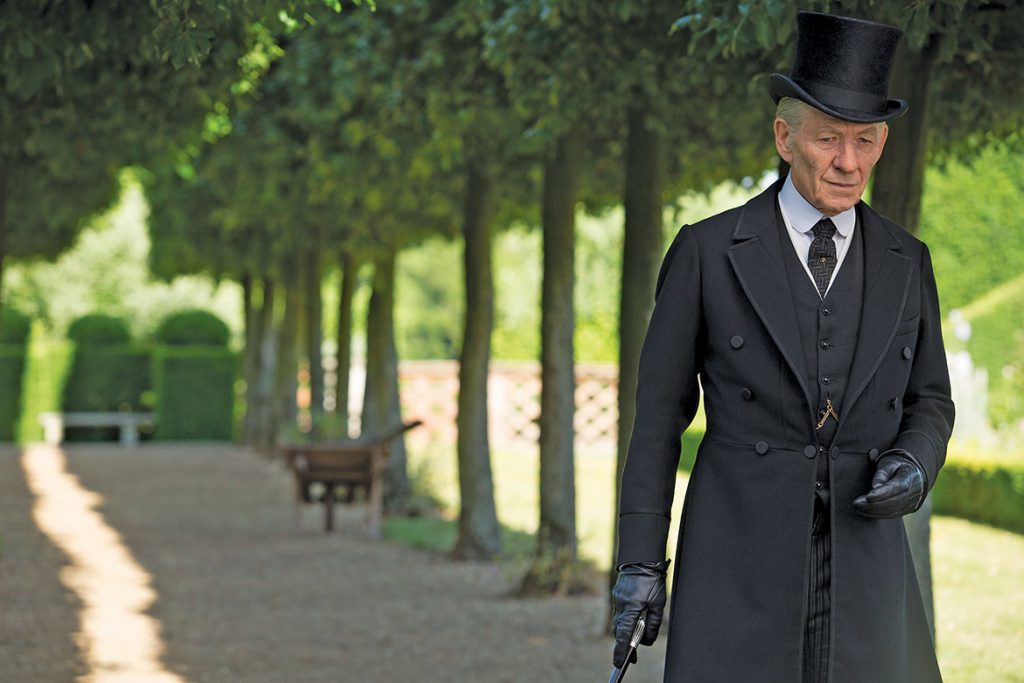Not since 1974, when reviewers were startled to find 11 different publishing houses boasting 11 new Sherlock Holmes titles, including Nicholas Meyer’s blithely literate “The Seven-Percent Solution,” has the Great Detective enjoyed so extensive a cultural revival.
A superb BBC series wittily updates the adventures; a pallid modern series joylessly plays on CBS; and a grubby, diminutive Victorian Sherlock plays second fiddle to CGI effects in theatres.
And now Gandalf comes to Baker Street: more precisely, to the South Downs in Sussex, where Sherlock Holmes, in the person of Sir Ian McKellen, lives in retirement. Although based on the 2006 novel, “A Slight Trick of the Mind,” by Mitch Cullen, “Mr. Holmes” gives audiences, especially millennials, a superb opportunity to acquaint themselves with the authentic Sherlock Holmes.
It’s 1947. Holmes is 93. Retired 30 years, he resides on a small, seaside bee farm. In lonely frailty he relies on his housekeeper, Mrs. Munro (another excellent performance from Laura Linney), to care for his daily needs but, grieving over the needless wartime death of her husband, she distances herself from him.
Her precocious 10 year-old son, Roger (Milo Parker), however, is fascinated by Mr. Holmes and assists with his beekeeping.
The boy’s enthusiasm for Dr. Watson’s old accounts, “all highly embellished,” Holmes maintains, impels him to finish a project long put off: setting down his last case in his own words. Watching a movie based on Watson’s version (starring Nicholas Rowe, who years ago portrayed “Young Sherlock Holmes”) is no help. He must depend on memory alone.
Flashbacks to the late Edwardian era show the detective’s attempts to piece together the case that ended his career. Roger spurs him on, eagerly commenting on his friend’s scratched down snatches of recollection, while both ponder the mystery of Holmes’ declining bee population.
This is important since Holmes has been staving off advancing senility with distillations of the bees’ royal jelly. Hearing of the benefits of prickly ash plants from Japanese correspondent, Masuo Umezaki (nicely realized by Zak Shukor), Holmes travels to post-bombing Hiroshima for local samples — which opens up yet another mystery.
“Who is Sherlock Holmes if he no longer has that amazing mental acuity?” McKellen asked, underscoring one of the film’s themes. Minus deerstalker cap or pipe, Sir Ian is still easily recognizable as the beloved ratiocinator, displaying piercing powers of perception and elegant strains of deductive reasoning.
Tall and slender at 75, McKellen believably straddles 30 years. Husband and wife makeup artists, Dave and Lou Elsey, aid considerably with subtle, seamless makeup and prosthetics creating distinctive hairline, nose and cheekbones, capturing the timeless physiognomy of the detective, realistically smoothing out wrinkles or adding liver spots.
With all the manners and mannerisms of a gentleman born and bred “in that age before the world went all awry,” McKellen gives a movingly lucid, realistic, compare-and-contrast character study in alternate eras. It is an emotionally riveting performance, marking him as one of Holmes’ finest impersonators.
It comes as a thunderbolt that “Mr. Holmes” distinguishes itself as an affirmation of the humanity of the unborn and the importance of older people acting as mentors to the young, providing them with direction for the future and an appreciation for the past. For this, McKellen’s scenes with the impressive 12-year old Milo Parker are noteworthy.
This film is beautifully moral with morally complex undertones: a mother lamenting the loss of two miscarried children; a man resenting the breakup of his family when his father deserted them. The moral subtext suffuses this story, putting it markedly at odds with Hollywood’s usually callous presentation of violent death and its detestable celebration of divorce, abortion, euthanasia, eugenics and derision of God.
A strikingly real spirituality informs this Sherlock Holmes, a trait also found in the original adventures but seldom explored. He cares for those around him and can mourn the loss of his deceased brother and friends, unashamedly shedding tears and praying for them.
One sequence toward the film’s end especially stands out: an event almost claims Roger’s life and threatens the survival of Holmes’ bees. It ascends to the level of Christian allegory, involving relationships of love with justice, nature, rationality and revenge.
Holmes’ line, “The bees are not to blame!” is eerily reminiscent, at least in tone, of the plea torn from the lips of the crucified Christ begging his Father’s mercy on brutal humanity. It is a testament to the courage and tremendous talents of Jeffrey Hatcher, the screenwriter, and Bill Condon, the director, that this film so prominently affirms human life.
The naturalness of “Mr. Holmes” has an authentically warm, nostalgic flavor reminiscent of the BBC’s “Downton Abbey,” with a distinctly European feel, embracing non-linear narrative and use of both of sweeping landscape shots and intimate close-ups.
Deeply satisfying, this movie, so beautifully written, directed and filmed, owes much of its charm to carefully atmospheric photography, convincing costumes and accurate art design and set decoration. The respective production heads and their teams deserve high praise for achieving faultless recreations of bygone eras.
In sum, “Mr. Holmes” is an elegant, rapturously lovely film overflowing with warmth, humor, emotional maturity and philosophical depth, with an aesthetic value beyond mere entertainment. Everyone attracted to Sherlock Holmes should rush right out to see this marvelous film.
“Mr. Holmes” is rated PG, with a running time of 105 minutes.

